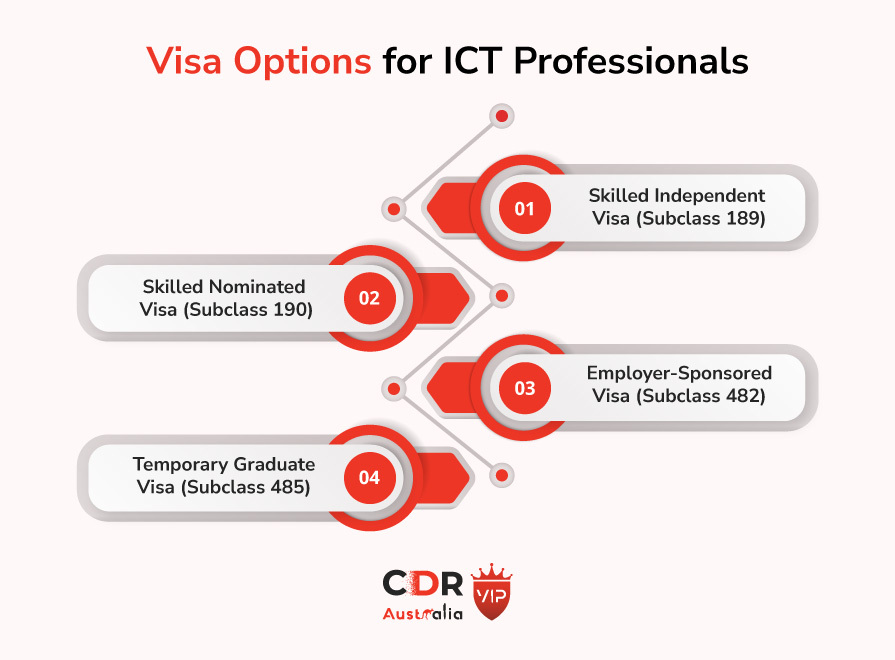Why ICT Professionals are migrating to Australia?

Why ICT Professionals are migrating to Australia?
The demand for skilled ICT professionals continues to rise as the world becomes increasingly interconnected and reliant on technology. With a thriving economy, beautiful landscapes, and a high standard of living, Australia is an attractive destination for those looking to migrate for work opportunities. But is it worth it for ICT professionals to migrate to Australia?
Knowing the different visa options from the Australian Computer Society (ACS) is essential when considering migration to Australia as an ICT professional. The Medium-term and Long-term Strategic Skills List (MLTSSL) and Short-term Skilled Occupation List (STSOL) are two critical lists of occupations that are in demand in Australia and are eligible for different skilled migration visas.
These lists include various ANZSCO codes for ICT professionals interested in migrating to Australia for work. This blog will explore the job market, living costs, and visa options for ICT professionals in Australia.
Medium and Long-term Strategic Skills List (MLTSSL)
The MLTSSL (Medium and Long-term Strategic Skills List) catalogs occupations that are in high demand in Australia and are eligible for skilled migration visas like the Skilled Independent Visa (Subclass 189) and Skilled Nominated Visa (Subclass 190). It encompasses professions in demand in both the short and long term.
Some examples of ANZSCO codes for ICT professionals on the MLTSSL include:
- Software Engineer (ANZSCO code: 261313)
- Database Administrator (ANZSCO code: 262111)
- Systems Administrator (ANZSCO code: 262113)
- Network Administrator (ANZSCO code: 263112)
- ICT Business Analyst (ANZSCO code: 261111)
- Systems Analyst (ANZSCO code: 261112)
- Developer Programmer (ANZSCO code: 261312)
- Computer Network and Systems Engineer (ANZSCO code: 263111)
Short-term Skilled Occupation List (STSOL)
The STSOL is a list of occupations in demand in Australia in the short term and is eligible for the Temporary Skill Shortage Visa (Subclass 482). This visa temporarily permits skilled workers to come to Australia to fill a specific skill shortage.
Some examples of ANZSCO codes for ICT professionals on the STSOL include:
- Web Developer (ANZSCO code: 261212)
- ICT Support Technician (ANZSCO code: 313112)
- Network Analyst (ANZSCO code: 263113)
- ICT Quality Assurance Engineer (ANZSCO code: 263211)
- ICT Support and Test Engineers (ANZSCO code: 263212)
- Telecommunications Network Planner (ANZSCO code: 313213)
It’s important to note that the visa application process and requirements can vary depending on the specific occupation and visa subclass. Working with a migration agent or immigration lawyer can help you meet your needs and submit a potent application.
Must Read: Top 10 most-demanded engineering fields in Australia 📚📚
Visa Options for ICT Professionals
There are several visa options available for ICT professionals who want to migrate to Australia, including:

-
Skilled Independent Visa (Subclass 189)
This visa is for skilled workers not sponsored by an employer or family member. To be eligible, you must have an occupation on the Skilled Occupation List (SOL) and score at least 65 points on the points-based system.
-
Skilled Nominated Visa (Subclass 190)
This visa is for those skilled workers nominated by a state or territory government. To be eligible, you must have an occupation on the SOL, meet the points-based system, and get appointed by a state or territory government.
-
Employer-Sponsored Visa (Subclass 482)
This visa is for skilled workers sponsored by an Australian employer. You must be on the Consolidated Sponsored Occupation List (CSOL) and meet the relevant skills and qualifications requirements to be eligible.
-
Temporary Graduate Visa (Subclass 485)
The visa gets intended for international students who have just completed their studies at an Australian educational institution. Its purpose is to enable them to remain in Australia for up to 18 months to obtain practical work experience and enhance their prospects of acquiring permanent residency.
In addition to the formal qualifications required for a job, instances of relevant experience can also play a vital role in securing the position. Moreover, a level of skill commensurate with the job’s requirements is also typically necessary, in addition to any formal qualifications and relevant experience.
The visa application process can be time-consuming. You must work with an experienced migration agent or immigration lawyer to guarantee you meet all the requirements and submit a robust application. For more information, you can contact to Department of Home Affairs (DHA).
It’s important to note that the visa application process can be complex, and the requirements can vary depending on your circumstances. Working with a migration agent or immigration lawyer can help you meet all your needs and submit a robust application.
Job Market for ICT Professionals in Australia
Australia has a strong and growing ICT industry, with job opportunities in software development, cybersecurity, data analytics, and project management. As stated by the Department of Employment, Skills, Small and Family Business, employment in the ICT industry is projected to grow by 11.5% between 2019 and 2024, with an estimated 83,500 job openings yearly.
In addition to the industry’s overall growth, specific areas within ICT are in high demand. For example, cybersecurity is a growing field for IT students moving to Australia, with an estimated shortage of over 17,000 cybersecurity professionals. Other areas of high demand include data analytics, cloud computing, and artificial intelligence.
It’s worth noting that while there are job opportunities in the ICT industry throughout Australia, certain cities are beautiful for ICT professionals. Sydney and Melbourne, in particular, have large and thriving tech scenes, with companies such as Atlassian, Canva, and Culture Amp headquartered there.
Living Costs in Australia
While the job market for ICT professionals in Australia is strong, it’s essential to consider the cost of living when deciding whether to migrate. Australia has a high cost of living compared to many other countries, particularly in its major cities.
Housing is one of Australia’s most significant expenses, with rental and property prices being among the highest in the world. According to Numbeo, the mean monthly rent for a one-bedroom apartment in Sydney is around AUD 2,200 (USD 1,640); in Melbourne, it’s around AUD 1,800 (USD 1,340).
Buying a house is even more expensive, with the median house price in Sydney being over AUD 1.2 million (USD 890,000) and Melbourne over AUD 850,000 (USD 630,000). Other living costs, such as groceries and utilities, are relatively high in Australia. However, salaries for ICT professionals in Australia are higher than in many other countries, which can help offset some living costs.
Benefits of Migrating to Australia for ICT Professionals
Migrating to Australia as an ICT professional can be a smart career move, offering a range of benefits that make it an attractive option for those seeking to further their careers. Some more benefits are as follows:
-
Thriving Tech Industry
The ICT industry in Australia is overgrowing, which means there are plenty of job opportunities for skilled ICT professionals. As a result, you can expect to get paid a competitive salary, which will help you cover the high cost of living in the country.
-
High Standard of Living
Australia is known for its high standard of living, and this is due to several factors, including its strong economy, excellent healthcare system, and high-quality education system. As an ICT professional, you can expect to enjoy a comfortable lifestyle in Australia, with access to all the amenities and services you need.
-
Beautiful Scenery
Australia is home to some of the most beautiful landscapes in the world, including stunning beaches, lush rainforests, and rugged outback terrain. As a migrant, you will have the opportunity to explore and appreciate the natural beauty of the country, which can be an excellent way to unwind after a hard day’s work.
-
Diverse Culture
Australia is renowned as a diverse cultural hub, making it a captivating destination to reside and work in. By living in Australia, you’ll be able to interact with individuals from various backgrounds and gain knowledge about different customs and traditions, which can enrich your understanding and enable you to cultivate a more global outlook.
Read more: Computer Engineer Jobs in Australia 💼💼
Challenges of Migrating to Australia for ICT Professionals
Some challenges of migrating to Australia for ICT Professionals are as follows:
-
High Cost of Living
As previously noted, the cost of living in Australia is relatively steep, especially in its major urban areas. Accommodation expenses, in particular, constitute a significant portion of one’s budget, necessitating substantial rent or mortgage payments. Other costs, including groceries, transportation, and utilities, can be relatively costly.
-
Visa Requirements
Obtaining a visa to work in Australia can be complex and time-consuming. You must meet specific requirements, such as education and work experience, and pass a points-based system. You may also need to provide evidence of your English language proficiency, and your employer may need to sponsor your visa.
-
Cultural Adjustment
As with any new country, adjusting to a new culture and pathway of life can be challenging. You may need to learn new social norms, customs, and behaviors and experience culture shock. However, you can adjust to your new surroundings and enjoy all Australia offers with time and effort.
-
Competition for Jobs
While the ICT industry in Australia is growing, there is also a lot of competition for jobs, particularly in the major cities. You must have strong qualifications, skills, and experience to stand out from other applicants and assured job.
Tips for Migrating to Australia as an ICT Professional
Below are the tips for migrating to Australia as an ICT Professional:

-
Research the Job Market
Before you decide to migrate to Australia, it’s essential to research the job market to see what opportunities are available for ICT professionals. Look for job postings online, read industry publications, and network with other professionals to understand the industry’s current state.
-
Choose Your Destination Wisely
While there are job opportunities for ICT professionals throughout Australia, certain cities and regions are beautiful. Sydney and Melbourne are known for their thriving tech scenes, while Perth and Brisbane are also emerging as tech hubs. Consider your personal and professional preferences when choosing a destination.
-
Get Your Qualifications and Experience Recognized
If you have obtained your qualifications and work experience outside of Australia, you may need to have them recognized by Australian authorities. It involves having your qualifications assessed and undergoing skills assessments. Starting this process earlier is essential, as it can take several months to complete.
-
Network
Networking is integral to finding a job in Australia, especially for ICT professionals. Join professional organizations, attend industry events, and contact other professionals to make connections and learn about potential job opportunities.
-
Improve Your English Language Skills
If English is not your first language, improving your language skills is crucial before arriving in Australia. It will help you with the visa application process and make communicating with colleagues and clients easier once you start working.
-
Consider Working with a Migration Agent
Obtaining a visa to work in Australia can be complex and time-consuming. Working with a migration agent or immigration lawyer can help you navigate the process and guarantee you meet all the requirements.
Read More: Onshore and Offshore Visa Application 💪💪
Salary Expectations for ICT Professionals in Australia
The salary expectations for ICT professionals in Australia depend on the industry, job role, and location. However, according to data from the Australian Government’s Job Outlook website, the median annual remuneration for ICT professionals in Australia is AUD 95,000.
In general, ICT professionals with more experience and higher qualifications can earn higher salaries. Additionally, those working in specific industries, such as finance and insurance, tend to earn higher wages than those in other industries.
The cost of living in Australia is relatively high, particularly in the major cities, so it’s important to factor this into your salary expectations. However, even with the high cost of living, many ICT professionals can enjoy a comfortable lifestyle in Australia.
Conclusion
So, is it worth it for ICT professionals to migrate to Australia? The answer depends on your circumstances and priorities. While the job market for ICT professionals in Australia is strong and salaries are relatively high, the cost of living can be expensive, particularly in the major cities. However, if you’re looking for a new adventure, a high standard of living, and possibilities for professional growth, Australia could be your perfect destination.
If you’re considering migrating to Australia as an ICT professional, it’s essential to do your research and seek professional advice to ensure that you clearly understand the job market, living costs, and visa options. With the proper preparation and support, migrating to Australia can be a life-changing opportunity for ICT professionals.
With the expert assistance of CDRAustraliaVIP, you can ensure that your CDR (Competency Demonstration Report) meets the standards required for skilled migration and take the first step towards a successful career in Australia.

